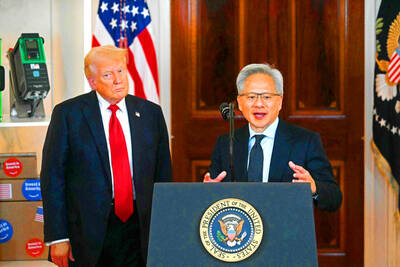Pegatron Corp (和碩), a key assembler of Apple Inc’s iPhones, on Thursday reported a 12.3 percent year-on-year decline in revenue for last quarter to NT$257.86 billion (US$8.44 billion), but it expects revenue to improve in the second half on traditional holiday demand.
The fourth quarter is usually the peak season for its communications products, a company official said on condition of anonymity.
As Apple released its new iPhone 17 series early last month, sales in the communications segment rose sequentially last month, the official said.

Photo: AFP
Shipments to Apple have been stable and in line with earlier expectations, they said.
Pegatron shipped 2.4 million notebook computers last quarter, unchanged from the previous quarter, the official said.
The momentum remains stable this quarter, they said.
The company also expects shipments of servers in the second half to be stronger than in the first half, in line with its previous guidance, the official said.
The new plant in Mexico that the company acquired last year entered volume production last quarter, they said.
Pegatron on Tuesday said that it had acquired another plant in Texas for US$30.72 million to boost server production capacity to increase supply chain resilience as requested by its customers.
The company also made progress in tapping into the auto onboard computer market, as it has begun shipping products to a major US electric automaker.
Pegatron said it plans to launch new products with two other automakers from the US, Japan or Europe.
Separately, Inventec Corp (英業達) on Thursday reported a 7.57 percent year-on-year increase in revenue to NT$176.29 billion for last quarter, a record for the period, supported by stable notebook and server shipments.
Inventec shipped 5.4 million notebook computers last quarter, flat from the previous quarter.
Notebook shipments are expected to decline slightly this quarter from the previous quarter, indicating that the holiday season effect is unlikely to materialize, a company official said.
Notebook computer shipments are still expected to grow 3 to 5 percent year-on-year this year, the company said.
Server shipments increased last quarter from the previous quarter, but revenue declined due to an unfavorable product mix, the company said.
Server shipments this quarter are expected to decline further, the official said.
Most servers shipped by Inventec would be Nvidia Corp’s B200 HGX this quarter, as they were last quarter, the company said.
Servers accounted for about 40 percent of Inventec’s total revenue last quarter.
The company said it aims to increase that to 50 percent for the whole of the year.

Taiwan Semiconductor Manufacturing Co (TSMC, 台積電) last week recorded an increase in the number of shareholders to the highest in almost eight months, despite its share price falling 3.38 percent from the previous week, Taiwan Stock Exchange data released on Saturday showed. As of Friday, TSMC had 1.88 million shareholders, the most since the week of April 25 and an increase of 31,870 from the previous week, the data showed. The number of shareholders jumped despite a drop of NT$50 (US$1.59), or 3.38 percent, in TSMC’s share price from a week earlier to NT$1,430, as investors took profits from their earlier gains

AI TALENT: No financial details were released about the deal, in which top Groq executives, including its CEO, would join Nvidia to help advance the technology Nvidia Corp has agreed to a licensing deal with artificial intelligence (AI) start-up Groq, furthering its investments in companies connected to the AI boom and gaining the right to add a new type of technology to its products. The world’s largest publicly traded company has paid for the right to use Groq’s technology and is to integrate its chip design into future products. Some of the start-up’s executives are leaving to join Nvidia to help with that effort, the companies said. Groq would continue as an independent company with a new chief executive, it said on Wednesday in a post on its Web

CHINA RIVAL: The chips are positioned to compete with Nvidia’s Hopper and Blackwell products and would enable clusters connecting more than 100,000 chips Moore Threads Technology Co (摩爾線程) introduced a new generation of chips aimed at reducing artificial intelligence (AI) developers’ dependence on Nvidia Corp’s hardware, just weeks after pulling off one of the most successful Chinese initial public offerings (IPOs) in years. “These products will significantly enhance world-class computing speed and capabilities that all developers aspire to,” Moore Threads CEO Zhang Jianzhong (張建中), a former Nvidia executive, said on Saturday at a company event in Beijing. “We hope they can meet the needs of more developers in China so that you no longer need to wait for advanced foreign products.” Chinese chipmakers are in

POLICY REVERSAL: The decision to allow sales of Nvidia’s H200 chips to China came after years of tightening controls and has drawn objections among some Republicans US House Republicans are calling for arms-sale-style congressional oversight of artificial intelligence (AI) chip exports as US President Donald Trump’s administration moves to approve licenses for Nvidia Corp to ship its H200 processor to China. US Representative Brian Mast, the Republican chairman of the US House Committee on Foreign Affairs, which oversees export controls, on Friday introduced a bill dubbed the AI Overwatch Act that would require the US Congress to be notified of AI chips sales to adversaries. Any processors equal to or higher in capabilities than Nvidia’s H20 would be subject to oversight, the draft bill says. Lawmakers would have